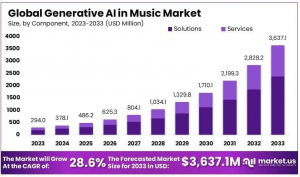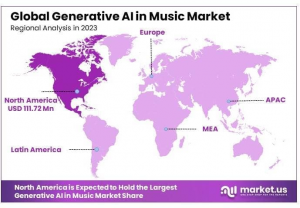Generative AI in Music Market Boost Music to Identify Patterns Growing at USD 3,637.1 Mn by 2033, with a CAGR of 28.6%
In 2023, North America leads with 38%, benefiting from its established tech industry and innovative music production...
In 2023, Solutions dominate the component segment with 65%, driven by growing demand for AI-driven music creation tools...”
NEW YORK, NY, UNITED STATES, January 27, 2025 /EINPresswire.com/ -- The Global Generative AI in Music Market is set for rapid growth, projected to reach USD 3,637.1 million by 2033, up from USD 294 million in 2023, growing at an impressive CAGR of 28.6% from 2024 to 2033. Several key factors are driving this expansion.— Tajammul Pangarkar
One of the primary drivers is the increasing demand for AI-generated music in various sectors, including entertainment, advertising, and gaming. Generative AI technologies allow musicians, producers, and content creators to quickly create high-quality music, reducing production time and costs. This has led to the adoption of AI tools for both personalized music recommendations and automated music composition.
Technological advancements in deep learning, machine learning, and neural networks have significantly improved the capabilities of AI in music, enabling it to generate more complex, nuanced compositions. AI platforms such as OpenAI's MuseNet and Aiva Technologies are creating a new wave of AI-generated music that appeals to both creators and consumers alike.
🔴 Click Here To Get a PDF Research Sample @ https://market.us/report/generative-ai-in-music-market/request-sample/
The market demand is further fueled by the rise of music streaming services, which benefit from AI in content curation, personalized playlists, and interactive experiences. Additionally, as AI continues to revolutionize music production, opportunities in AI-powered music education and virtual artists are emerging, providing new revenue streams and business models for the industry.
Key Takeaways
-- The Generative AI in Music Market was valued at USD 294 million in 2023 and is projected to reach USD 3,637.1 million by 2033, growing at a CAGR of 28.6%.
-- In 2023, the Solutions segment led the market, accounting for 65%, driven by the increasing demand for AI-powered music creation tools.
-- Cloud-based deployment was the dominant model in 2023, holding 74% of the market, enabling scalable and collaborative music production.
-- The Composition and Music Generation application segment was the largest in 2023, representing 28%, as AI continues to transform creative workflows.
-- North America held the largest market share in 2023, with 38%, benefiting from its strong tech infrastructure and innovative music production landscape.
🔴 Hurry Exclusive Discount For Limited Period Only @ https://market.us/purchase-report/?report_id=98916
Experts Review
The Generative AI in Music Market is experiencing rapid expansion, with government incentives and technological innovations playing a key role. Governments worldwide are investing in AI research and development through grants and subsidies, creating a favorable environment for innovation. These incentives encourage the adoption of AI in music creation, making advanced tools more accessible to both large studios and independent creators.
Investment opportunities in the market are substantial, particularly in AI-driven music production software, cloud-based solutions, and AI-powered music platforms. However, risks include high development costs, concerns around intellectual property rights, and potential challenges in data privacy. As AI-generated music becomes more common, the complexity of ownership and copyright issues may pose challenges for creators and investors.
Consumer awareness of AI-generated music is growing, with more listeners embracing personalized playlists and AI-powered music recommendations. However, some may remain skeptical about the authenticity and creativity of AI-generated content.
The technological impact of AI on the music industry is profound, enabling more efficient content creation, dynamic personalization, and a wider range of music genres. AI tools are transforming how artists produce music, from composition to mixing and mastering.
The regulatory environment surrounding AI in music is evolving. Governments are beginning to create frameworks addressing AI's role in content creation, ensuring transparency and protecting both creators and consumers from potential misuse of AI-generated music.
🔴 Get a PDF Research Sample @ https://market.us/report/generative-ai-in-music-market/request-sample/
Report Segmentation
Component: The market is primarily divided into solutions and services. Solutions dominate the market, driven by the growing adoption of AI-powered music creation tools for composers, producers, and content creators. These solutions include software platforms, AI algorithms, and music composition tools. The services segment includes AI training, cloud-based infrastructure, and consulting services that support music creators in integrating AI tools into their workflows.
Deployment: The market is further segmented into cloud-based and on-premise deployments. The cloud-based segment leads, owing to its scalability, flexibility, and ability to enable remote collaboration, which is crucial for global music production teams.
Application: Key applications of generative AI in music include composition and music generation, music personalization, and sound design. The composition and music generation segment holds the largest share, as AI-driven tools are increasingly used to automate the creation of music tracks, reducing production time and costs.
Region: Geographically, the market is segmented into North America, Europe, Asia-Pacific, Latin America, and Middle East & Africa. North America holds the largest market share, driven by its established technology infrastructure and a strong presence of music production companies adopting AI technologies.
Key Market Segments
By Component
Solutions
Services
By Deployment
Cloud-based
On-premises
By Application
Composition and Music Generation
Performance Enhancement and Virtual Collaboration
Personalized Music Recommendations
Music Production and Remixing
Music Transcription and Analysis
Other Applications
🔴 Get the Full Report at Exclusive Discount (Limited Period Only) @ https://market.us/purchase-report/?report_id=98916
Major Driving Factors
Drivers
The Generative AI in Music Market is primarily driven by the increasing demand for AI-powered music creation tools that streamline the music production process. These tools allow creators to quickly generate high-quality music, automate repetitive tasks, and reduce production costs. Advancements in machine learning and neural networks are also improving AI’s ability to compose complex and original music, making it a more appealing option for creators. The rise of personalized music recommendations on streaming platforms is further fueling market demand, as AI enables tailored playlists and unique music experiences for users.
Restraints
Despite the growth, the market faces high development costs and challenges in the adoption of AI tools among smaller creators. Intellectual property concerns regarding AI-generated music also pose a significant barrier. Moreover, the complexity of integrating AI into existing music production workflows may deter adoption.
Challenges
A major challenge lies in consumer skepticism regarding the authenticity and creativity of AI-generated music. There are also data privacy concerns around AI’s use in analyzing and creating music.
Opportunities
The market offers opportunities in AI-powered music education, virtual artists, and cloud-based collaboration platforms for remote music production. As AI technology evolves, it could open new revenue streams and enhance creative possibilities in the industry.
Key Player Analysis
Key players in the Generative AI in the Music market include OpenAI, Aiva Technologies, Amper Music, and Endlesss. OpenAI, with its MuseNet platform, is a leading player, revolutionizing music creation with AI tools that can compose full songs in various genres. Aiva Technologies specializes in AI-driven music composition, serving both commercial and personal applications.
Amper Music provides AI-powered music tools that enable creators to generate music for film, games, and advertising. Endless focuses on real-time, collaborative AI music creation, fostering a community of artists creating music with AI assistance. These companies are pushing the boundaries of creativity and innovation, transforming how music is created, produced, and consumed.
Top Key Players in the Market
Shutterstock Inc.
Soundful
Boomy Corporation
OpenAI
Google DeepMind
AIVA Technologies
Amper Music
Mubert
Other Key Players
Recent Developments
Recent developments in the Generative AI in Music Market highlight significant strides in AI-driven music creation. OpenAI launched MuseNet, capable of composing complex musical pieces across multiple genres, significantly enhancing music production capabilities. Aiva Technologies introduced new features to its AI platform, allowing composers to generate original scores with greater customization and creativity.
Amper Music expanded its offerings, integrating more advanced AI models to assist in music creation for different media platforms, including advertisements and video games. Additionally, Endless introduced a cloud-based AI music collaboration platform, enabling real-time creation and sharing of music among artists globally. These advancements are democratizing music creation and pushing the boundaries of AI in the creative industry.
Conclusion
The Generative AI in Music Market is experiencing rapid growth, driven by technological advancements and increasing demand for AI-generated music. Key players like OpenAI, Aiva Technologies, and Amper Music are revolutionizing music creation with AI-powered tools.
Despite challenges such as intellectual property concerns and consumer skepticism, the market presents significant opportunities in areas like music personalization, AI music education, and cloud-based collaboration. As AI technology continues to evolve, it will further shape the future of music production, offering both creative possibilities and new revenue streams.
➤ Explore Other Interested Topics
Language Translation Device Market - https://market.us/report/language-translation-device-market/
Travel Planner App Market - https://market.us/report/travel-planner-app-market/
AI Note-Taking Market - https://market.us/report/ai-note-taking-market/
Partial Discharge Monitoring Systems Market - https://market.us/report/partial-discharge-monitoring-systems-market/
Wearable AI Market - https://market.us/report/wearable-ai-market/
AI in Education Market - https://market.us/report/ai-in-education-market/
Computing Power Market - https://market.us/report/computing-power-market/
Spatial Computing Market - https://market.us/report/spatial-computing-market/
Hyperscale Computing Market - https://market.us/report/hyperscale-computing-market/
ChatBot Market - https://market.us/report/chatbot-market/
Lawrence John
Prudour
+91 91308 55334
Lawrence@prudour.com
Visit us on social media:
Facebook
LinkedIn
Legal Disclaimer:
EIN Presswire provides this news content "as is" without warranty of any kind. We do not accept any responsibility or liability for the accuracy, content, images, videos, licenses, completeness, legality, or reliability of the information contained in this article. If you have any complaints or copyright issues related to this article, kindly contact the author above.



